#dean priest
Text
I need to figure out just for my own satisfaction why the majority response to Dean Priest of the Emily trilogy is so negative, while the majority response to Tom Lynn of Fire and Hemlock is just kind of…neutral? Like I’ve seen people acknowledge that Polly/Tom is a little bit weird and the age gap is a problem, but it doesn’t translate to violent hatred of Tom as a character. And I’m trying to figure out if the difference lies in the way that their respective authors write them, write the relationship, or if the difference lies in the reader base. Honestly, though, I wonder if it comes down to the fact that Polly knows and acknowledges that she wants to be in love with Tom, while Emily rejects Dean’s romantic love and only wants his friendship. AKA, in one pairing we get the possibility of an equal happily ever after, and in the other pairing, it’s predicated on inequality with no chance of being anything else. Maybe that’s the key that I need—the way that Polly vs. Emily negotiate their way in, out, and through the relationship. Because otherwise, Tom and Dean really act quite similarly—they befriend the young Polly/Emily, give them books to read, kind of hang around and illuminate the world for them—and they do it for their own benefit. It’s true that Tom isn’t angling after Polly to marry her the way Dean seems to be, but at the end of the day, *Fleabag voice* it is a love story. I feel like it’s just kind of splitting hairs because Tom still gets Polly to rely on him the way Emily does to Dean. So it seems to me that the difference lies not so much in Tom vs Dean as Polly vs Emily.
Anyway, I’m curious if any other LMM and DWJ fans have thoughts about this difference in reception.
#emily of new moon#fire and hemlock#lm montgomery#diana wynne jones#dean priest#tom lynn#lmm lockdown#fh readalong#*retreats to corner and cautiously holds some cardboard over my head*
48 notes
·
View notes
Text


(@bellasbookclub’s Emily posts pushed this thought into my brain)
39 notes
·
View notes
Text


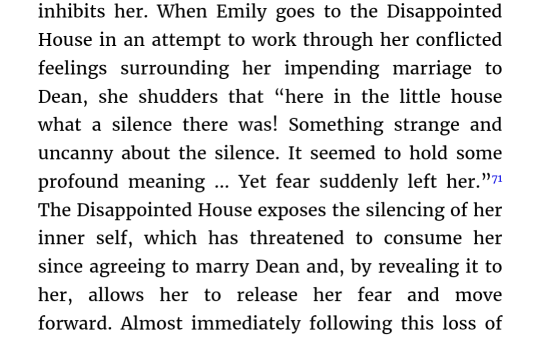
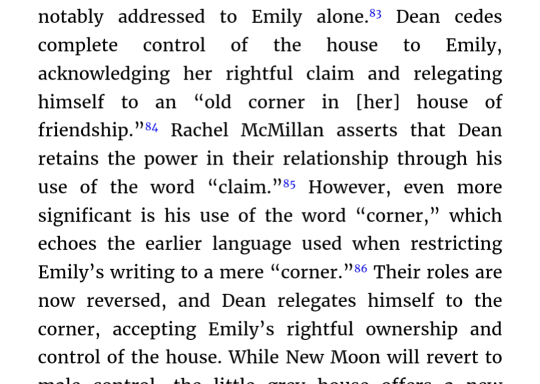
passages from the "The House that Belongs to me": The Appropriation of Patriarchal Space in L.M. Montgomery's Emily Trilogy that I found interesting
#lm montgomery#lm montgomery and gender#emily of new moon#i learned from this article that emily marrying teddy is the subject of much debate among scholars - whether it's her capitulating#to patriarchal standards or not#dean priest
57 notes
·
View notes
Text
Yesterday Road, Today Road, Tomorrow Road...
Perhaps it's just another manifestation of my overthinking, but it seems to me that the three paths in Long John's Bush might have been written as a metaphor for Emily's life. Each path seemed to be somehow linked to a person who was important to Emily.
The paths were named by Emily and her friends, because: "The To-day Road is by the brook and we call it that because it is lovely now. The Yesterday Road is out in the stumps where Lofty John cut some trees down and we call it that because it used to be lovely. The To-morrow Road is just a tiny path in the maple clearing and we call it that because it is going to be lovely some day, when the maples grow bigger." (Emily of New Moon).
TO-MORROW'S ROAD (EMILY'S AMBITIONS AND DREAMS. TEDDY KENT):
The metaphor of Tomorrow Road was most clearly outlined. On the one hand, of course, it symbolized Emily's passion for writing and her ascent to the Alpine Path of glory and fame. As for the character with whom Tomorrow Road was most closely associated, it was Teddy Kent.
First of all, To-morrow Road never changed its name, even though by the time Emily reached her early teenage years, the maples grew big. In Emily Climbs, Tomorrow Road became the place of Teddy and Emily's meetings, where they shared their dreams and hopes for the future: "Then Teddy came for me and we walked together up the field and through the To-morrow Road. It is really a To-day Road now, for the trees along it are above our heads, but we still call it the To-morrow Road—partly out of habit and partly because we talk so much on it of our to-morrows and what we hope to do in them. Somehow, Teddy is the only person I like to talk to about my to-morrows and my ambitions. There is no one else." (Emily Climbs).
To-morrow Road was a place that marked the milestones for both Teddy and Emily (Teddy especially). Here he told Emily that his mother decided to allow him to attend Shrewsbury High School; here he told her that he had received an art scholarship and was going to the college in Montreal. Here he proposed. Here she was waiting for him with Dean's letter.
It seemed to me that Teddy and Emily's relationship was all about the future. Thorough Emily Climbs they seemed to think that they couldn't be each other's "today", because they both had their own separate dreams ("to-morrows") to conquer before they would be free to set on their rainbow quest together. (Side note: Montgomery skillfully mentioned that To-morrow Road was in fact - already To-day Road).
By the end of Emily Climbs, as their romance started to blossom, Emily's initial reaction was fear. Early on, she realised that she served a jealous goddess. We didn't get a glimpse into Teddy's feelings, but it was obvious from the start how ambitious and passionate he had been for his art. Perhaps it was something more than just a fear of Emily's refusal that drove him to silence when he had meant to ask her to wait for him? The scene itself happened on To-morrow Road (another symbol that it wasn't their time yet, perhaps?). During this scene, they both experienced a clash of two extremely strong passions: on the one hand, the desire to improve their art and fulfill their ambitions and dreams, and on the other - an awakening love. Teddy, before leaving for Montreal told Emily that there were two things in life that he had wanted "tremendously", but never told her that having her as his wife was one of these things.
I wonder if Juliet and Douglas Starr's tragic story might have forced Teddy's silence. Douglas Starr had once been young and ambitious too, but wouldn't have been accepted by Murrays because of his poverty. The result of this love was tragic; Juliet's elopement broke her family's heart and both she and Douglas died early, leaving Emily all alone. Perhaps Teddy felt that he might have been tolerated as Emily's friend, but not as her suitor. Since he seemed to doubt in his own success (especially since his chosen profession rarely resulted in a fortune), he might have been more likely to keep silent.
One quote of this scene between Teddy and Emily has always intrigued me:
"We walked along the To-morrow Road—[...]—until we reached the fence of the pond-pasture and stood there under the grey-green gloom of the firs. I felt suddenly very happy and in those few minutes part of me planted a garden and laid out beautiful closets and bought a dozen solid silver teaspoons and arranged my attic and hemstitched a double damask table-cloth—and the other part of me just waited." (Emily Climbs).
Because... was it possible that she had seen herself from the future? This was the exact spot where Teddy reconciled with Emily by the end of Emily's Quest. Where he had finally confessed his love [1]. But, most importantly, this was also a spot of the very last scene of the trilogy: Emily, waiting for Teddy to tell him that Dean had gave them a Disappointed House as a wedding gift [2]. There was a certain symbolism in Teddy coming to her - the exact opposite of To-morrow Road's scene that took place in Emily's Climbs, where it was Emily who went away, leaving him alone: "Teddy was looking at the dim gold of Blair Water and scowling. Again I had a feeling that night air was not good for me. I shivered, said a few polite commonplaces, and left him there scowling." (Emily Climbs).
In a way, their story came into full circle. They both achieved success and overcame their own biggest faults (pride, insecurities, selfishness, vanity). Unlike their seventeen year old selves, they got to know what loneliness meant - they found out that their ambitions were not enough to fulfill their heart's desires.
By the end of trilogy, Emily and Teddy still had their own "Alpine Paths" to climb, but from this time, they would have each other's help and support. They also had the dreams of future they share: of home, fireplace, toast and bacon and marmalade.
YESTERDAY ROAD. THE PAST AND FAMILY TRADITIONS. LOST DREAMS. JULIET MURRAY, DOUGLAS STARR, DEAN PRIEST.
Yesterday Road symbolized the past, for it used to be lovely once. Perhaps it might have been a place where Douglas and Juliet used to meet (their own "To-day Road"). For each member of the Murray family, Yesterday Road might have had a different meaning. For Elizabeth, it could have symbolized either her youth, either a period when Juliet was a child; for Laura - her former love for Dr. Burnley; for Jimmy - his lost potential; for Juliet - her childhood, family, first love.
For Emily, Yesterday Road symbolized family traditions (the chapter in which Cousin Jimmy told her family stories was titled "The Book Of Yesterday") as well as her parents' love story. All that shaped her as a woman and a writer, but also nearly became an obstacle to fulfilling her dreams. Due to Juliet's elopement, Aunt Elizabeth almost kept Emily from receiving an education. The whole family tried to marry Emily off to cousin Andrew, so that Juliet's story wouldn't repeat itself. During Emily's later years, Yesterday Road might have symbolized Emily's lost hopes and dreams.
The person who directly referred to Yesterday Road was Dean Priest: "I shall carry pictures of you wherever I go, Star," Dean was saying [...] "pacing up and down in this old garden—wandering in the Yesterday Road—looking out to sea." (Emily's Quest).
In the second part of the trilogy, Dean Priest directly admitted that he was aware that Emily's future would not be his future: 'I hate to hear of your to-morrows—they cannot be my tomorrows.' (Emily Climbs).
During the year that he and Emily had been engaged, Emily rarely thought about the future, and felt anxious about it: "Always to be afraid of to-morrow? Content—even happy with to-day—but always afraid of tomorrow. Was this to be her life? And why that fear of to-morrow?" (Emily's Quest). In the rare moments that Emily thought of her future, she saw Teddy, instead of Dean in those visions. "She saw herself there in the future—flitting through the little rooms—laughing under the firs—sitting hand in hand with Teddy at the fireplace—Emily came to herself with a shock. With Dean, of course, with Dean. A mere trick of the memory." (Emily's Quest).
Perhaps Emily didn't understand what Dean subconsciously realized: that he would never be able to fulfill Emily's future: "to let myself dream something that couldn't come true—that I knew ought not to come true—" (Emily's Quest). During the year they spent together, he allowed himself to dream, but was left with nothing more than memories and ashes. And so, for Dean a Yesterday Road symbolized the one golden year of his engagement; the only glimpse into real happiness he had ever had. Emily became his yesterday. It is interesting how he worded his letter, containing his wedding gift: "And some day I will come to see you in it. I claim my old corner in your house of friendship now and then." (Emily's Quest). Again, he doesn't refer to her future, but her past ("my old corner").
TODAY'S ROAD: CHILDHOOD. FRIENDSHIP. ILSE BURNLEY.
Today's Road symbolized Emily's happy childhood and her friendships. It is the one path that never seems to be stained with bitterness or regrets. As for a character that simply screams "TODAY" - it is obviously Ilse Burnley, who never seemed to care about the past or think of the future:
"As far as Ilse was concerned it seemed as if no quarrel had ever taken place. “Why, that was yesterday,” she said in amazement, when Emily, rather distantly, referred to it. Yesterday and to-day were two entirely different things in Ilse’s philosophy." (Emily of New Moon).
"Ilse was growing, too, blossoming out into strange beauty and brilliance, knowing no law but her own pleasure, recognizing no authority but her own whim." (Emily of New Moon).
"Ilse had always been a merry, irresponsible creature." (Emily's Quest). "All her life she had done exactly as she wanted to do whenever the whim took her. No sense of responsibility whatever." (Emily's Quest).
Besides, Ilse seemed to be the contant "today" of Emily's childhood and youth. She couldn't be Emily's "to-morrow", though, for both girls would have to carve their own separate futures, build their own homes in which the other one would be a cherished guest: "we'll visit each other, you and I—and compare our children—call your first girl Ilse, won't you, friend of my heart—" (Emily's Quest). Emily didn't seem to mind visiting the house Ilse was going to build with her imaginary husband; but she did mind being a guest at Teddy's house, few years later when Ilse repeats her invitation: "When Teddy and I come back and set up house in Montreal you must spend every winter with us, darling. New Moon is a dear place in summer, but in winter you must be absolutely buried alive." Emily made no promises. She did not see herself as a guest in Teddy's home." (Emily's Quest).
That's perhaps the difference: Ilse would be a vital part of Emily's future and vice versa, but it would be their husbands who'd be a part of their to-morrows. Even when Ilse got married to Perry and the three friends reunited, Emily's life wasn't complete. Perhaps it couldn't be, because Ilse - dear as she was - couldn't fill a certain longing in Emily's heart and soul - the voice that needed Teddy's love and presence.
Headcanons for the Long John's paths:
Juliet and Douglas used to walk through Yesterday Road. He asked her to marry him there. Before she eloped, Juliet had a good cry there. She was thinking of her half-sibling and her father - she loved them fiercely, despite everything.
Teddy and Emily said their wedding vows in Long John's Bush, under the firs where they used to meet and where they reunited. (Both Aunts were absolutely mortified by this idea). Or, if it wasn't an official ceremony, at least they had repeated the vows there. (Let's be real, Emily would definitely repeat her vows after the ceremony, changing "Frederick" into "Teddy").
The future generations liked playing on To-day Road.
The names of the paths were never changed, even if the paths themselves did.
The children of four friends invented their own names for the paths, though.
The quotes [1]-[3]:
[1] "Suddenly I heard Teddy's signal whistle in the old orchard. [...] We walked along the To-morrow Road—it has grown so beautiful that one wonders if any to-morrow can make it more beautiful—until we reached the fence of the pond-pasture and stood there under the grey-green gloom of the firs. [...] I'm going to work hard—I'm going to get everything possible out of those two years,' Teddy said at last,[...] '"And when I come back—' he repeated—stopped again. "'Yes?' I said. I don't deny to this my journal that I said it a trifle expectantly. "'I'll make the name of Frederick Kent mean something in Canada!' said Teddy." (Emily Climbs).
[2] "It came clearly and suddenly on the air of a June evening. An old, old call—two higher notes and one long and soft and low. [...] It came again. And Emily knew that Teddy was there, waiting for her in Lofty John's bush—calling to her across the years. She went down slowly—out—across the garden. Of course Teddy was there—under the firs. [..] He put out his hands and drew her to him, with no conventional greeting." (Emily's Quest).
[3] "How very—dear—of Dean. And I am so glad—he is not hurt any longer." She was standing where the To-morrow Road opened out on the Blair Water valley. Behind her she heard Teddy's eager footsteps coming to her." (Emily's Quest).
#lm montgomery#emily of new moon#Long John's Bush#Meta I guess?#And some headcanons#Tomorrow Road#Emily Starr#Teddy Kent#Ilse Burnley#Juliet Starr#Dean Priest#A long post#Thank you if you managed to read it all
13 notes
·
View notes
Text
With all the amazing conversation about "Emily's happy ending" going on, there is one question I keep asking myself: Would Emily ever go back to writing if she married Dean Priest? And, however crazy it may sound, however unpopular this opinion is, I came to the conclusion that she would... in a time.
Now, I know that Dean is extremely possesive. He won Emily by a lie, he crushed her dreams, he laughted at her ambitions. He hated her writing, because it took her away from him. He wanted to possess her wholly, body and soul, he wanted her to belong to him whole-heartedly. I also know that Emily was deeply hurt, crushed, that her hopes and dreams were in shatters. I know that she kept telling herself she was going to be satisfied with being only Dean's wife and that her writing was no longer important. I know that she didn't believed in herself and her talent at this point of her life.
The problem is - she wouldn't be happy, or satisfied, or fulfilled, or whole. She had to write, just as she had to breathe. She got engaged to Dean during the most vulnerable period of her life, when she was hardly herself; weakened after her long illness, afraid of the future, ashamed of her past. But the need to write was still alive, deep inside her soul, unactive yet, but not dead.
In canon, it was Dean telling her the truth about A Seller of The Dreams, that allowed Emily to write again. But I think it was only a trigger. It is equally possible that, in a time, something else would make her want to write. It could be anything: Teddy's painting The Smiling Girl, a letter from someone who read her stories, Aunt Elizabeth's sickness, a loss of someone she cared about, reading one of her old poems, anything. I believe that Emily would feel the need to write herself out. Montgomery once said that only lonely people wrote journals, but there are many kind of loneliness - a loneliness of unshared thoughts, for example. So, I feel that once Emily encountered something she couldn't deal with or talk over with with Dean, she would turn back to her writing.
Also... it isn't impossible that Dean would have told Emily the truth about her first book later, during their marriage. Now... I know, it is not exactly in his character, but please, hear me out. Of course, we see Dean being jealous - of Emily's writing, of her friends. But, for many years, he showed Emily his support, he read her stories and poems. The scene in Emily Climbs, when he gets angry at Emily for wanting to see Teddy, shows his character - he doesn't want to let her go, but doesn't stop her.
Also, the moment Dean decided he hated A Seller of The Dreams shows that however he is guilty of Priests' jealousy, he usually tries to fight it: "The one black drop in his veins—that Priest jealousy of being first—suddenly made its poison felt." (Emily's Quest). It is in Dean's nature to be jealous, indeed, but he isn't possessed by it 24/7. He is capable of tenderness, and he isn't an evil person. He decided to tell Emily the truth about A Seller of The Dreams after she broke their engagement, even though he could walk away, knowing that Emily wouldn't be able to escape his grasp. But he chose not to. Why? In my opinion - because he regretted what he had done and felt ashamed. He wouldn't be able to go on, if he hadn't told the truth.
Montgomery's scholars interpreted Dean's wanting to buy Emily a writing desk as "limiting her writing to a small space", but in my opinion, it was something else. It was Dean's way of dealing with his regrets over killing a vital part of Emily. It was his way of trying to fix something he destroyed, even if he wasn't ready to say it plainly, yet.
I know it probably sounds as if I am trying to defend Dean and whitewash his character. I am not. He is not the supportive partner Teddy would (hopefully) be. Dean would have trouble accepting Emily's devotion to anything that wasn't him. That being said, I think that Dean, at this point, was lying to himself that this Emily was going to be enough. One of the reasons he wanted to marry Emily was her fierce spirit and vitality:
"What a child!” he muttered. “I’ll never forget her eyes as she lay there on the edge of death—the dauntless little soul—and I’ve never seen a creature who seemed so full of sheer joy in existence." (Emily of New Moon).
Emily who couldn't write was crushed - destroyed - a shadow of herself. She found it difficult to dream, or to be truly happy. Dean Priest, looking at her with the eyes of adoring man, might not have realized this change yet.
But once they were married, his regrets and fears would probably creep in, slowly, gradually. The realization that he killed the part of Emily would come in a time - years, possibly - but I think he wouldn't be able to stand this thought.
He'd spill his secret - he'd tell Emily the truth. Perhaps she wouldn't be able to forgive him - perhaps he'd lose her forever, but he would tell her (even on his deathbed, I think).
I know it is a very unpopular opinion, but I honestly think Emily Starr would sonehow find the strength to write again, even if she married Dean Priest.
26 notes
·
View notes
Quote
I want you to notice especially that little gate over yonder. It isn't really needed. It opens only into that froggy marsh beyond the wood. But isn't it a gate? I love a gate like that—a reasonless gate. It's full of promise. There may be something wonderful beyond. A gate is always a mystery, anyhow—it lures—it is a symbol.
Emily’s Quest, L.M. Montgomery
#L.M. Montgomery#words#quotes#Emily's Quest#Emily of New Moon#Lucy Maud Montgomery#Dean Priest#gates#literature#classic literature#Yeah so I'm rereading this section of Emily's Quest again and I'm feeling perfectly Fine
82 notes
·
View notes
Text

Cleansing my vision after reading any dialogue between Dean Priest and Emily Starr tbh.
37 notes
·
View notes
Text
So I wonder if Emily ever tried to have another stab at the Seller of Dreams? It always made me sad that she never attempted to rewrite the book again after Dean's confession. I know she, obviously, wrote other books, and as a writer you do outgrow some of your early works, but seeing as it meant so much to her, after her marriage to Teddy, could she have tried again? She could only have improved it.
I'm also thinking, what if Dean is the one who suggests it to her? Maybe he goes through some self-reflection or whatever (adopts some of the philosophy in East Asia, as he likes to travel there), and wants to make amends. Maybe he writes her a letter in which he tells her he remembered the book and one particular line that he liked. This prompts her to start working on it again, and eventual publishing. It would be a redemption for Dean too. Perhaps he can finally accept Emily being happy with Teddy, and satisfies himself with his little corner as a family friend.
Idk just something I thought of. If you like your endings cheesy lol.
#l.m. montgomery#lmmblogging#emily of new moon#dean priest#at the end of the day i like everyone ending up happy#quest is bleak enough without adding more doom to it#mypost
12 notes
·
View notes
Text
Byronic Hero Bracket Round Of 128 Batch C #5
Tommy Shelby from Peaky Blinders vs. Dean Priest from Emily of New Moon

Reasons under the cut (spoilers for both)
(All sources from TV Tropes)
Tommy Shelby:
Tommy Shelby from Peaky Blinders, being very intelligent, handsome, cynical, brooding, with a propensity for drinking and he is The Don of the Birmingham mafia.
Previously Beaten: Lucifer
Dean Priest:
Dean Priest of the Emily of New Moon series embodies a number of these character traits. He's well-educated and charismatic, but his disabilities have also made him cynical, bitter, and rather self-destructive. He travels often, which makes him a bit of a self-imposed exile. He is a loner. He is self-interested to a degree, but can also be selfless when he wants to be. LM Montgomery also gives him lots of Mr. Rochester parallels, who is himself a Byronic hero.
Previously Beaten: John Harrison

#character tournament#fandom tournament#tumblr tourney#tournament poll#poll bracket#polls#tumblr polls#fandom bracket#tumblr bracket#character bracket#byronic hero#tommy shelby#peaky blinders#dean priest#emily of new moon
3 notes
·
View notes
Text

watching supernatural...
#supernatural#supernatural fanart#dean winchester#dean x castiel#castiel#destiel#destiel fanart#spn fanart#priest dean#is supernatural fandom still alive?#hope is recognizable
2K notes
·
View notes
Text
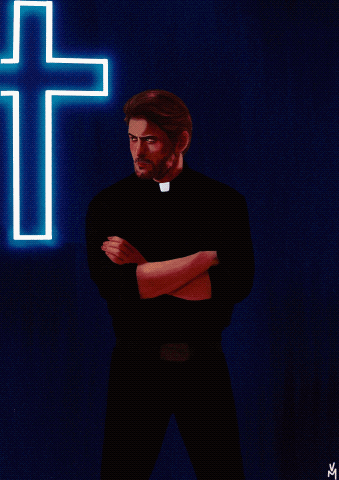
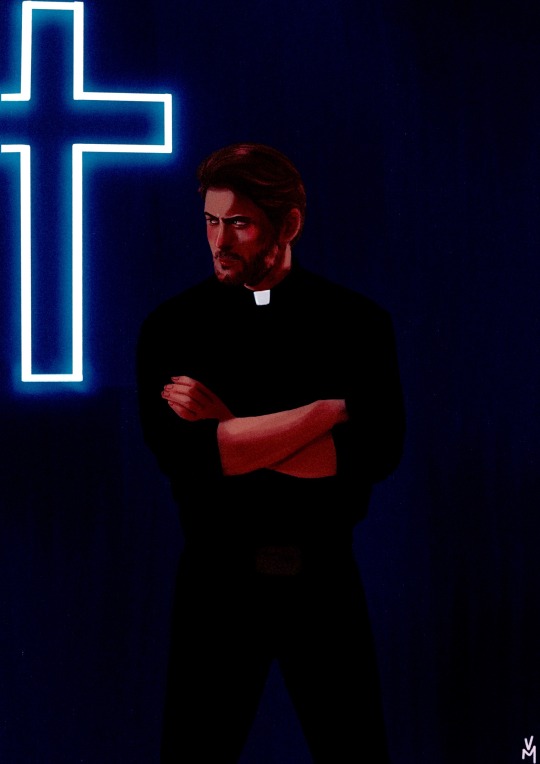
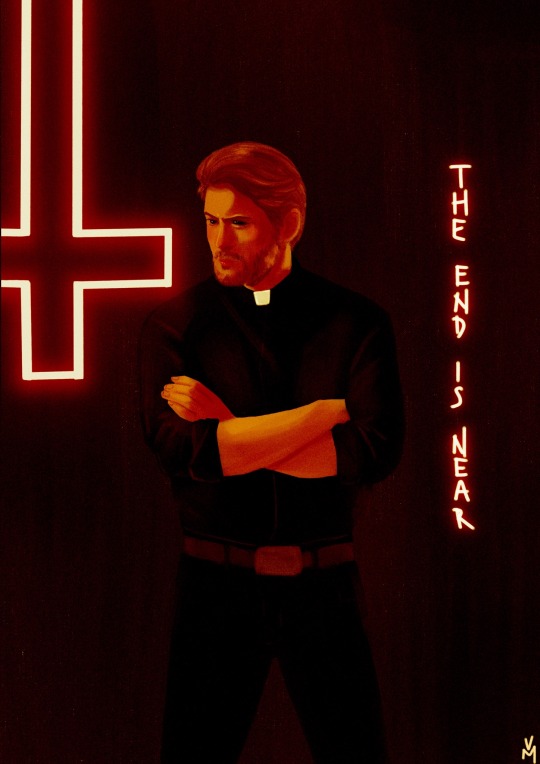
IT'S TOO LATE TO PRAY. THERE'S NO SALVATION.
-
stumbled upon a metal phonk playlist and it made me draw this
#flashing warning#priest!dean#demon!dean#dean winchester#dean winchester art#dean winchester fanart#spn#spn art#spn fanart#supernatural#supernatural art#supernatural fanart#artsist on tumblr#vmart#vin.jpg#vin.gif
2K notes
·
View notes
Text
A woman who has a sense of humour possesses no refuge from the merciless truth about herself. She cannot think herself misunderstood. She cannot revel in self-pity. She cannot comfortably damn anyone who differs from her. No, Emily, the woman with a sense of humour isn't to be envied.
LM Montgomery, Emily Climbs
#i know it’s probably something to dislike about dean that he so casually can sum up women like this#but like emily i too have drunk the cool-aid and so this quote lives rent free every time i start feeling “tragic” about my life#lm montgomery#l m montgomery#emily of new moon#dean priest
22 notes
·
View notes
Text
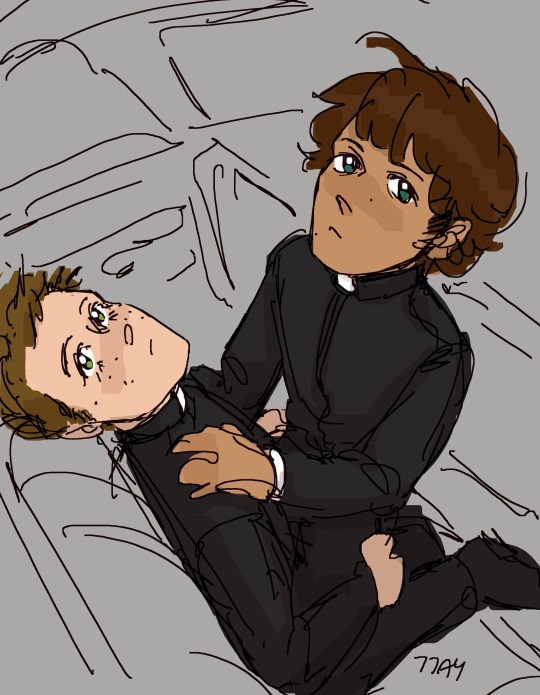
POV: you were curious as to why father simmons and father frehley’s car was still parked in front of your house after the wake and went to investigate
#just a little doodle#it came to me in a (day)dream#wincest#samdean#damn! these bitches gay! good for them good for them#<- your reaction btw#jaydraws#spn#supernatural#sam winchester#dean winchester#wincest fanart#supernatural fanart#spn fanart#priest! dean winchester#priest! sam winchester
284 notes
·
View notes
Text

OFF KILTER QUESTION OF THE WEEK? more likely than you think!
I chose to do this one today because it is much more involved and detailed (as much as you want it to be anyway!) Does this maybe, just a little, read like an english class assignment? I bravely answer, we're on tumblr, which is basically where the people who couldn't get enough of english class landed. Relying heavily on that assumption as we head into our (lengthy) question:
As discussed before, one potential way to analyze media is through the lens of the following questions: (1) what are the goals of this piece of media? (2) did this piece of media accomplish those goals? with an added (3) were those goals worthy in the first place?
How would you answer these three questions in regards to Dean Priest and his role in the Emily trilogy?
#lm montgomery#dean priest#*sits back with cup of tea*#emily of new moon#lm montgomery question of the week
35 notes
·
View notes
Text

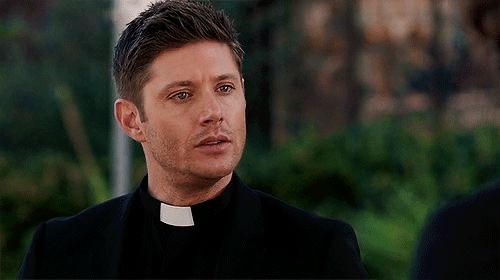
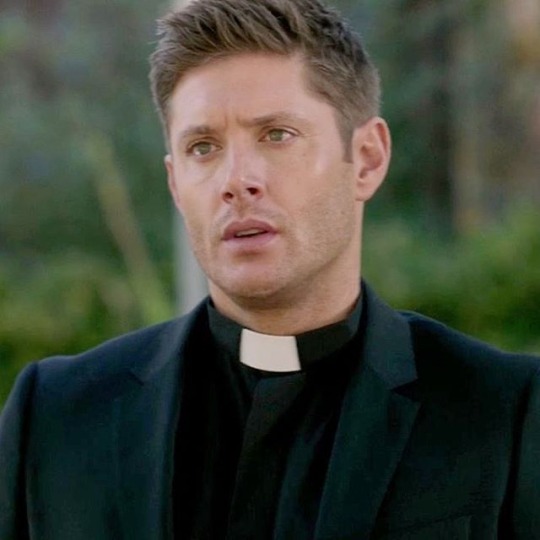
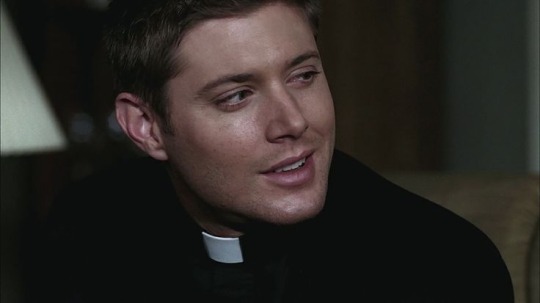

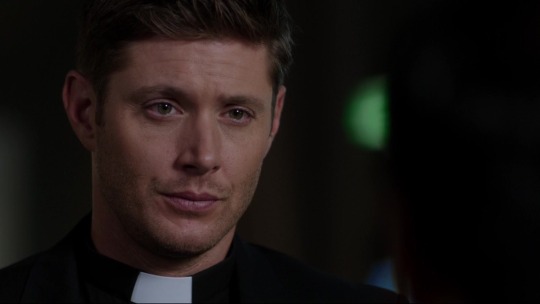
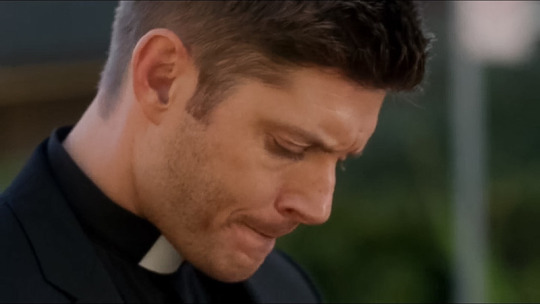
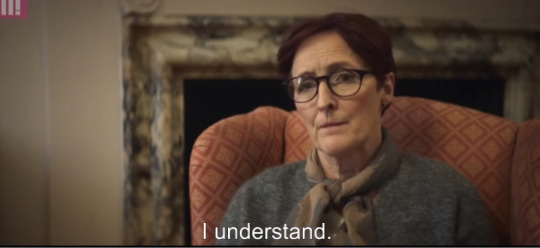
“I want to fuck a priest.”
#supernatural#spn#supernatural rewatch#supernatural fandom#spn fandom#Spn rewatch#dean winchester#jensen ackles#fleabag#hot priest#sexy priest
313 notes
·
View notes
Text
Part 1 of Dean Priest's headcanons (written in a great hope he shall be forgiven):
Dean's first memory is seeing his mother cry. She is hiding in his nursery, with her bowed head, her shoulders shaking with sobs. He reaches out to stroke her hair, trying to comfort her. She wraps her arms around him and whispers "remember, dear, you ARE enough". Years later, he isn't quite sure if he hadn't dreamt it - but he clings to the memory nonetheless. It is all he has.
He grows up, seeing his parents argue. Well, it is his father who raises his voice - his mother never does. She doesn't scream even when his father throws a dinner plate at her. Dean can't help thinking his parents argue because of him.
Dean learns there is a difference between him and the other children, when he is only a few years old. He can't run or play the way other children can. His brothers and sisters are all lively and loud - he isn't. That's why he asks his mother to read him stories. She spends more time with Dean than with her other children (he needs me more, she thinks) or her husband (nobody could blame her for THAT). But Dean sees the envious glances his siblings and father throw at him. Envious - and hateful. It is when he knows - they despise him, too. He keeps telling himself he doesn't care - up to the point he almost believes it.
His mother sings him an old lullaby. She has a lovely, melodic voice. He knows the lyrics by heart. "On a night like this I always think of the 'hills where spices grow.' For years, he hopes that one day he'll be able to 'fly like a youthful hart or roe.' He remembers the day he realizes he won't.
Dean learns how to read very early on. He reads and writes better than his older siblings and everyone notices that. His teachers praise him in front of the class and, for the first time in his life, he feels proud. But then, he hears whispers. He is lame. It is his own brother who starts calling Dean a Jarback and the name sticks. His brother never dares to call him like this in front of their mother, but doesn't hold his tongue in front of father. And father only smiles, in his own, wicked way, so Dean knows he must have heard. He never says a word, though. Dean tells himself it doesn't matter. But his resentment grows.
His mother dies when Dean is only eight years old. Dean is the only one who can't cry (people will later say he's souless - not only lame, not only a Jarback, but also souless). He puts a single, white lily on his mother's grave (he hates lillies afterwards).
Life goes on. Slowly, Dean becomes more and more of a Jarback. He turns to books - they are the only company he will ever need, he tells himself.
Uncle James suddenly dies, with no wife nor children, when Dean is sixteen. He leaves all of his fortune to Dean, to the horror of the clan. He's the only one with brains, Uncle James used to say. All Priests hate Dean a little more - but he only laughs. His laughter has a cynical ring to it, now.
Dean doesn't believe in friendship, so at first he doesn't trust Douglas. Why should he? Douglas is everything Dean has never been. He's good-looking, strong, kind. But they both love books, so in a time, they warm up to each other. They spend long hours in library, arguing over the complexity of human relationships in A Tale of Two Cities, and Dean thinks that maybe... maybe he can be happy.
Perhaps there is something between Dean and Douglas, or perhaps not. Dean never finds out. He goes abroad to study, while Douglas finds a job as a journalist. Dean offers him a loan, but Douglas is too proud to take it. "I'll earn the money and join you". But he never does - because Juliet Murray happens, with her slow, blossoming smile. Douglas writes him about the wedding and Dean writes back, congratulating them. He doesn't understand - for many years he doesn't understand, not until Emily smiles at him - her mother's smile, he later finds out - and he's utterly lost.
He travels to escape. He travels to forget.
He tries to write a book, once. He vowes he will never try again. *inspired by a fanfic*
He tells Emily "I'll wait for you" and hates himself for that. After all, she's just a child. Douglas' child, which is far worse. Dean loved her father - he isn't sure what the love was, as a friend, as a... But now, Douglas is gone and Emily is the only thing Dean has left. *Douglas/Dean inspired by fanfic and conversation on tumblr*.
Dean thinks Emily is going to be gone, too. But he picks up the broken aster she crushed and puts it away between the page of Jane Eyre. He marks a verse "All glorious rose upon my sight / That child of shower and gleam." *canon*
He asks Emily if she's going to miss him. He no longer travels to escape - he travels to hear her voice say "very much so, Dean".
(Part 2 in a a separate post, because it is too long).
20 notes
·
View notes